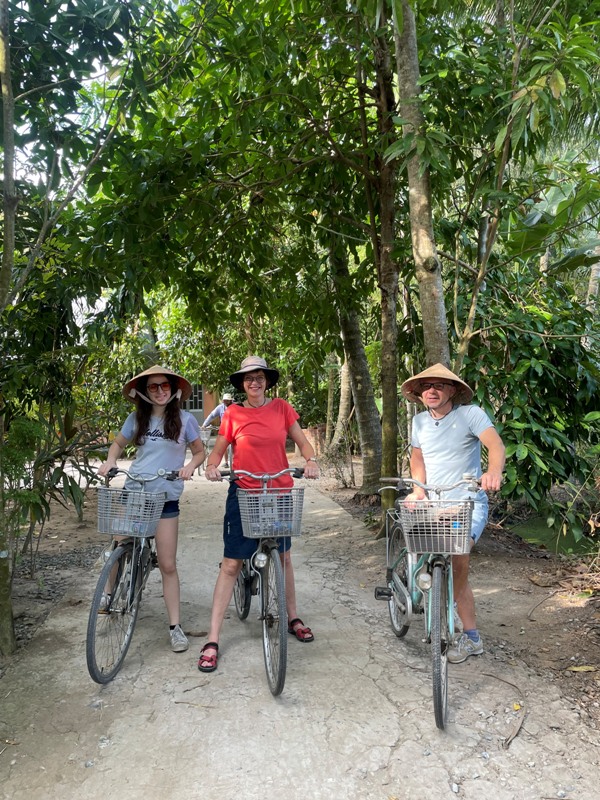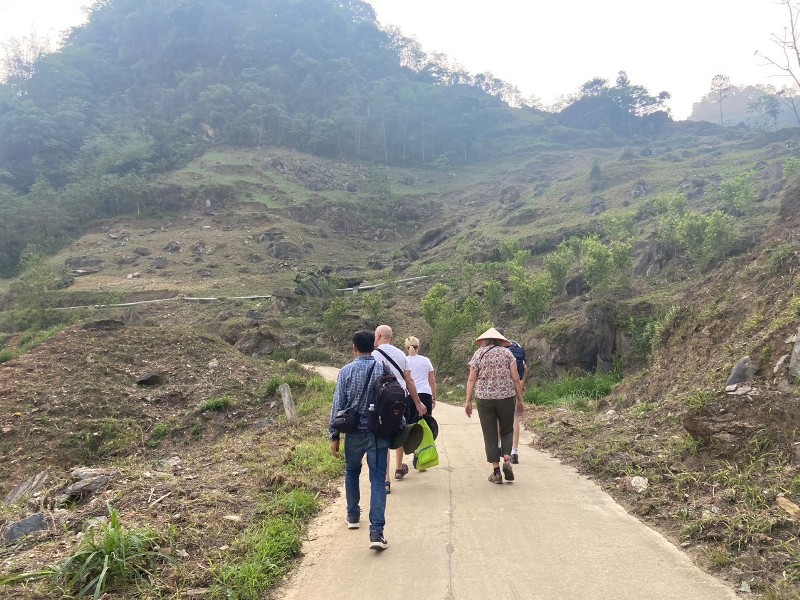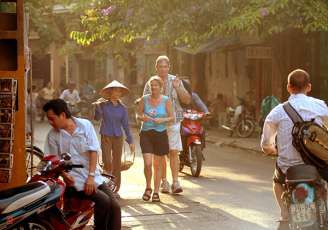
Vietnam embarks on a journey to reduce tourism carbon footprint
- on Nov 12, 2024 By: Phuong Mai NGUYEN
Contrary to popular belief, "smoke-free" tourism is not automatically synonymous with sustainability and eco-friendliness. The race toward “net zero,” which aims to control carbon emissions in the tourism industry, is becoming ever more urgent, and Vietnam cannot stand aside. According to the World Bank, Vietnam’s carbon footprint in 2022 reached around 344 million tons of CO₂ per year, an astounding figure that ranks the country 17th globally. Vietnam’s “footprint” is evidently larger than that of many other countries in the region.
How can Vietnam address the carbon emissions associated with its tourism footprint? The answer is at the end of this article—don’t miss it!
"Green tourism," "Sustainable tourism," and “Carbon footprint reduction”
Ben Tre province recently issued 15 “Green Passports” (Net Zero Passports - NZP) to tourists participating in the "Net Zero Tours Ben Tre." This initiative, led by C2T Media and Tourism in collaboration with the Institute of Research on Application and Business Innovation (3AI), has made this province the first destination in the world to offer this eco-friendly passport.
A study published in Nature Climate Change in 2018 revealed that greenhouse gas emissions from tourism activities are rising rapidly, accounting for about 8% of global CO2 emissions. With a multi-trillion-dollar industry, projections estimate that by 2025, tourism could generate 6.5 billion tons of carbon, approximately 13% of global greenhouse gas emissions.
The concepts of green tourism, sustainable tourism, and carbon footprint reduction are gaining traction among Vietnamese travelers, particularly among youngsters. An independent survey of 1,000 people over 18 in Vietnam has shown that 96% of participants prioritize sustainable tourism in their travel choices. Looking to the future, 94% of Vietnamese travelers express a desire to opt for more sustainable travel in the next 12 months. Among them, 56% feel guilty when choosing forms of tourism with a negative environmental impact, while 21% make more responsible choices because they believe it is the right thing to do.
A green journey ...
While green and sustainable tourism is frequently discussed, many still wonder why tourism, often described as a “smokeless sector” and “green industry,” still contributes to significant carbon emissions and generates a considerable carbon footprint.
The carbon footprint refers to the amount of greenhouse gases emitted throughout a trip, including transportation, accommodation, catering, and leisure activities. According to the journal Nature Climate Change, international tourism, particularly long-haul flights, is the fastest-growing segment, accounting for around 25% of the tourism sector's CO2 emissions. While air transport dominates as a means of travel and the main source of carbon emissions, green flights are becoming an essential trend that the global aviation industry, including Vietnam’s, must follow.
On May 27, 2024, flight VN660 from Singapore to Hanoi marked a historic milestone by making Vietnam Airlines the first Vietnamese airline to successfully complete a commercial flight using green, renewable fuel. This flight used Sustainable Aviation Fuel (SAF), made from renewable resources like animal fats, used cooking oils, and agricultural waste. In addition to Vietnam Airlines, Vietjet Air has also taken steps towards SAF adoption, having signed a financial agreement with Novus Aviation Capital and collaborating with SAF One to further develop this technology. Vietjet Air already utilizes modern aircraft that reduce pollutant emissions.
While the aviation industry strives to reduce emissions of every flight, many countries around the world are investing in greener transport technologies, especially in the rail sector. With its low CO2 emissions rate, trains represent a sustainable and environmentally friendly mode of transportation. In Vietnam, the Ministry of Transport is studying the possibility of implementing electric vehicles powered by green energy on existing rail lines by 2030. Additionally, investments are planned to build new rail lines focusing on electrification and gradually replace older trains with green-energy-compatible models. High-speed lines, such as the Ho Chi Minh City–Can Tho route and the North-South high-speed line, are also planned to operate on electric energy.
The development of eco-friendly transport systems, such as green buses, eco-friendly cabs, and self-service bicycles, is booming in Vietnam, both in the major metropolises and in the main tourist destinations. Within the next few years, visitors to Vietnam will be able to enjoy an entirely green journey, switching from air travel to trains, metros, buses, and eco-taxis.
...toward more eco-friendly destinations
Alongside green transport options, many localities in Vietnam are adopting eco-conscious tourism services and activities. A pioneering example is the historic town of Hoi An, which launched its "plastic-free hotel" model as early as September 2003. For over a decade, this UNESCO World Heritage city has been aiming to reduce its plastic waste by 13 to 15% annually, with the ultimate goal of eliminating all single-use plastics by 2025.
Other initiatives have recently been launched across the country. In places like Co To (Quang Ninh), Trang An (Ninh Binh), and Con Dao (Ba Ria-Vung Tau), visitors are now prohibited from bringing plastic bottles, nylon bags, and other polluting materials during their stay.
In response to this tendency, travel agencies are developing "green tours" that focus on sustainability. Some notable initiatives include:
• Waste-collection boat tours in Hôi An
• Cave exploration tours in Phong Nha - Ke Bàng (Quang Bình)
• Wild island exploration tours in "Tu Bình" (Khánh Hòa)
• Turtle-watching tours during nesting season at Hòn Bảy Cạnh (Côn Đảo)
• Beach cleanup tours in Vân Đồn (Quảng Ninh)
• Agricultural tourism tours in Trà Vinh
These eco-friendly travel experiences allow tourists to actively participate in conservation efforts, making Vietnam an increasingly attractive destination for sustainable tourism.
Alternative tourism options to reduce your carbon footprint
Tourism can be a major source of carbon emissions, but it is possible to adopt more sustainable solutions to minimize its impact on the environment. Here are a few alternatives to help reduce your carbon footprint when traveling:
Offset your flight carbon emissions
Flying is the main source of travel-related carbon emissions. If flying is unavoidable, consider offsetting your emissions by supporting eco-friendly projects. These initiatives often include tree planting, forest preservation, or financing renewable energy projects.
Pack light
Reducing the weight of your luggage helps reduce aircraft fuel consumption, thereby reducing CO2 emissions. Only bring what you really need, and opt for versatile clothing.
Choose direct flights
Whenever possible, select direct flights instead of those with multiple layovers. Since takeoff and landing consume the most fuel, reducing stopovers helps to limit environmental impact.
Use electronic tickets
Whenever possible, opt for electronic tickets rather than printed ones. This small act helps reduce paper waste and the carbon footprint associated with ticket printing.
Choose walking or cycling
Once at your destination, consider walking or cycling to get around for any short distance. These modes of transport produce zero carbon emissions, promote better health, and offer a more authentic experience of the region you're visiting.
 \
\

Stay in eco-friendly accommodations
The number of eco-friendly accommodations such as campsites, hotels, and guesthouses that promote renewable energies, collect rainwater, and prioritize local products is on the rise. Some lodging facilities also offer workshops on how to reduce your carbon footprint. Look out for labels like “Green Hotel,” which reward eco-conscious establishments.
Embrace eco-responsible practices on vacation
Adopting sustainable practices while traveling not only protects the environment but also supports local economies and can lead to more authentic experiences. Here are some tips to make your stay eco-friendly:
• Support local products: Opting for locally made products reduces transportation-related emissions. Check food labels for local origins and choose locally grown or produced items, which support local farmers and reduce your carbon footprint.
• Encourage local brands: Choose local brands over imported ones. These products typically travel shorter distances and are often more affordable. Bring a reusable bag for shopping to avoid single-use plastic.
• Use air conditioning wisely: In your accommodation, avoid leaving windows open when the AC or heating is on. Only use these devices as needed and set them to moderate temperatures.
• Reduce and recycle plastic waste: Single-use plastics, like straws, are major pollutants. Refuse plastic straws and use reusable bags for shopping. If you must buy bottled water, opt for larger bottles to refill at your hotel when possible.
• Reuse toiletry containers: Bring reusable bottles for toiletries instead of buying travel-size items. Refilling these containers with your usual products minimizes plastic waste.
• Use eco-friendly sunscreens: Some sunscreens contain chemicals harmful to coral reefs. Choose reef-safe sunscreens without toxic components to protect marine life. Always check labels before swimming in the ocean.
• Turn off appliances at home before leaving: Before going on vacation, unplug electronic devices, turn off heating, and disable the water heater to save energy. If you need lights on for security, use timers to ensure they only turn on as needed.
These sustainable tourism practices can help protect our planet while enhancing your travel experience, allowing you to make a positive impact wherever you go.
TOLUNHA
Related articles:
>> The best ecotourism experiences in Vietnam
>> Vietnam Tour 2024-2025: Where to go? Which itinerary? What to do? How many days?
 Español
Español Français
Français




















Morgane Ter Cock
on Dec 18, 2025HerbertPhomaMS
on Oct 19, 2025Lilyan Cuttler
on Oct 15, 2025Avenue17XC
on Sep 14, 2025Avenue18JL
on Jul 21, 2025